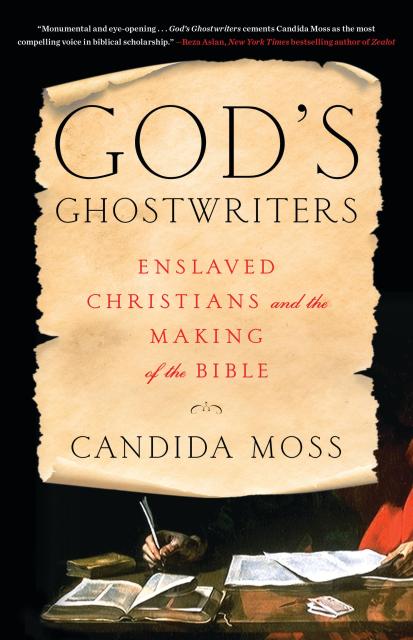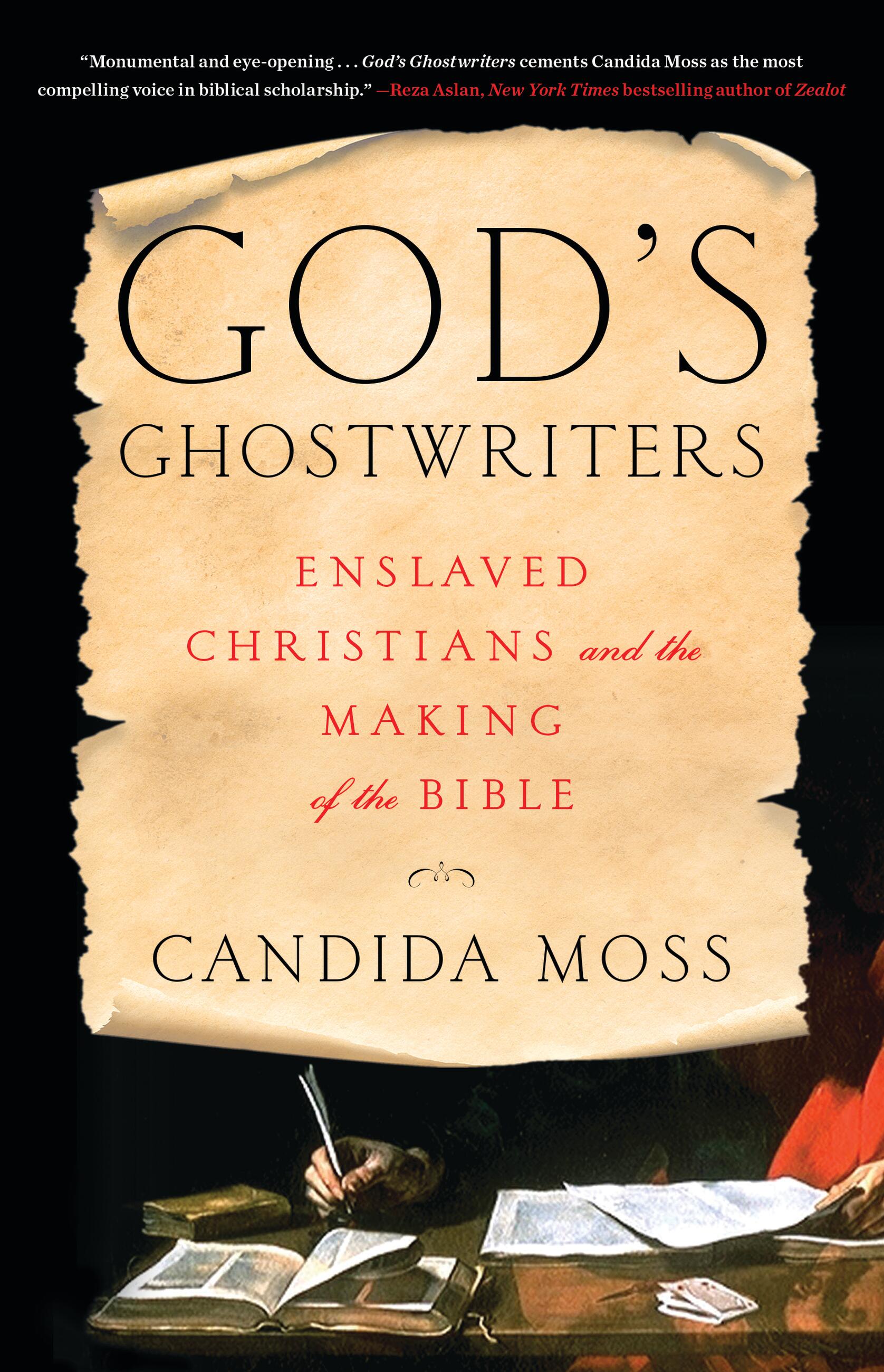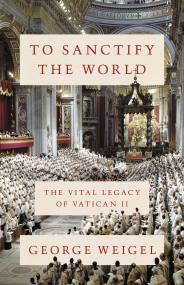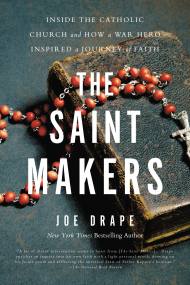God's Ghostwriters
Enslaved Christians and the Making of the Bible
Contributors
By Candida Moss
Formats and Prices
Price
$30.00Price
$39.00 CADFormat
Format:
- Hardcover $30.00 $39.00 CAD
- ebook $14.99 $19.99 CAD
- Audiobook Download (Unabridged) $24.99
Also available from:
From an award-winning biblical scholar, the “monumental and eye-opening” story of how enslaved people created, gave meaning to, and spread the message of the New Testament, shaping the very foundations of Christianity in ways both subtle and profound (Reza Aslan).
For the past two thousand years, Christian tradition, scholarship, and pop culture have credited the authorship of the New Testament to a select group of men: Matthew, Mark, Luke, John, and Paul. But hidden behind these named and sainted individuals are a cluster of unnamed, enslaved coauthors and collaborators. These essential workers were responsible for producing the earliest manuscripts of the New Testament: making the parchment on which the texts were written, taking dictation, and refining the words of the apostles. And as the Christian message grew in influence, it was enslaved missionaries who undertook the arduous journey across the Mediterranean and along dusty roads to move Christianity to Rome, Spain, and North Africa—and into the pages of history. The impact of these enslaved contributors on the spread of Christianity, the development of foundational Christian concepts, and the making of the Bible was enormous, yet their role has been almost entirely overlooked until now.
Filled with profound revelations both for what it means to be a Christian and for how we read individual texts themselves, God’s Ghostwriters is a groundbreaking and rigorously researched book about how enslaved people shaped the Bible, and with it all of Christianity.
For the past two thousand years, Christian tradition, scholarship, and pop culture have credited the authorship of the New Testament to a select group of men: Matthew, Mark, Luke, John, and Paul. But hidden behind these named and sainted individuals are a cluster of unnamed, enslaved coauthors and collaborators. These essential workers were responsible for producing the earliest manuscripts of the New Testament: making the parchment on which the texts were written, taking dictation, and refining the words of the apostles. And as the Christian message grew in influence, it was enslaved missionaries who undertook the arduous journey across the Mediterranean and along dusty roads to move Christianity to Rome, Spain, and North Africa—and into the pages of history. The impact of these enslaved contributors on the spread of Christianity, the development of foundational Christian concepts, and the making of the Bible was enormous, yet their role has been almost entirely overlooked until now.
Filled with profound revelations both for what it means to be a Christian and for how we read individual texts themselves, God’s Ghostwriters is a groundbreaking and rigorously researched book about how enslaved people shaped the Bible, and with it all of Christianity.
Genre:
-
“Clever, important and well-argued... By far the best account we have of the roles played by enslaved people in supporting the high literary culture of the ancient world… No one can possibly doubt, after reading this vigorous and provocative book, that the whole texture of Christian thought would have looked very different without them.”The Wall Street Journal
-
"God's Ghostwriters...brings the world of ancient slavery to grim life, and connects larger issues of collaboration and credit to the material facts of ancient work, making it impossible to ignore the labor between the lines.”New York Times Book Review
-
“Erudite… Students of Christian history will find plenty to appreciate in this innovative reinterpretation.”Publishers Weekly
-
“Readers of the Bible, you are almost certainly in for a shock.… Drawing on recent archaeology and literary criticism, [Moss] persuasively argues that some of the most important parts of the New Testament were written or edited by slaves… [Her] massive achievement is to shift the paradigm and tell the early Christian story (as far as is possible) from the perspective of the enslaved."The Spectator (UK)
-
"A tour de force... an intellectual triumph... [God's Ghostwriters] encourages us to think of the New Testament in particular, and early Christian writing in general, in provocatively exciting new ways."The Irish Independent
-
"At once eminently readable and rigorously researched, God’s Ghostwriters cements Candida Moss as the most compelling voice in Biblical scholarship. The role of enslaved people in the writing and dissemination of the gospels has been ignored for far too long. We all owe Moss a debt of gratitude for this monumental and eye-opening work.”Reza Aslan, New York Times bestselling author of Zealot: The Life and Times of Jesus of Nazareth
-
"A fascinating and beautifully written book. The Bible is the word of God—but who, precisely, put that word on the page? Here, Candida Moss makes the invisible hands that wrote the Bible visible. She writes with a depth of scholarship and a lightness of touch that make this book both powerful and compelling."Catherine Nixey, author of The Darkening Age
-
“A lucid, convincing, and deceptively transgressive book, God’s Ghostwriters gives the unfree a rightful place in history."Rev. Jarel Robinson-Brown, author of Black, Gay, British, Christian, Queer
-
"From the first paragraphs of God’s Ghostwriters, I was entranced. Everything that Candida Moss writes is worth reading, but she has outdone herself here by bringing enslaved people in the ancient world to life, in the process shining a new light on the roots of Christianity. The results are thought-provoking, intensely interesting, and immensely readable."Eric Cline, The George Washington University, and bestselling author of 1177 B.C.: The Year Civilization Collapsed
-
“God's Ghostwriters is a work of historical, theological, and literary scholarship that will hold your attention like a well-crafted novel. I found myself saying, ‘Fascinating!’ and ‘I never knew that’ on page after page. Dr. Moss provides a fuller sense of the social and economic milieu out of which the New Testament arose, and in so doing, helps every reader, whatever their religious background, to get a clearer sense of what it might have felt like to be part of the Christian movement at its very early beginnings.”Brian D. McLaren, author of Do I Stay Christian?
-
“A scintillating and unforgettable read, God’s Ghostwriters recovers the social world of those enslaved intellectual laborers who powered the literary accomplishments of the Roman Empire—and of the early Christian church. In the process, it transforms our understandings of authorship, personhood, and faith. I marvel at the book’s scholarship, its imagination, and most of all its ethics of attentiveness and care. In these pages, the long-overlooked finally receive their due.”Dan-El Padilla Peralta, Princeton University, and author of Divine Institutions and Undocumented
-
“Scholarship, at its best, goes beyond increasing knowledge; it reorients our understanding of familiar aspects of our lives. And for Americans, there is no book more familiar, and yet more uprooted from its historical milieu, than the Bible. After reading Moss’s groundbreaking book, God’s Ghostwriters, no reader—religious or otherwise—will be able to think about the Christian Bible as an abstract religious text that is innocent of slavery. Moss's extraordinary, accessible book provides crucial insights about why European Christianity has been so susceptible to justifying racial domination and equips contemporary Christians to have a more honest and ethical engagement with the New Testament.”Robert P. Jones, president and founder of Public Religion Research Institute, and New York Times bestselling author of The Hidden Roots of White Supremacy and the Path to a Shared American Future
-
“A searing recovery of the role of enslaved individuals in the production and dissemination of the New Testament, God’s Ghostwriters is both historically grounded and morally compelling in its delineation of how not only metaphors but also structures of slavery undergird Christian theology. Moss’s attention to ancient trafficking, the connection of slavery to disability, and the function of both psychological and physical torture makes her book all the more essential for understanding Christian origins.”Amy-Jill Levine, Vanderbilt University, and co-editor of The Jewish Annotated New Testament
-
"Brimming with learning and buzzing with contemporary urgency, this extraordinary book catches and amplifies the long-muted voices of the enslaved workers whose creative efforts made ancient literature possible. At once provocative and humane, it tells a radically different version of the story of early Christianity to the one most of us grew up with."Tim Whitmarsh, University of Cambridge, and author of Battling the Gods: Atheism in the Ancient World
-
“Probably the most important book in New Testament studies written in the last half century. God’s Ghostwriters: Enslaved Christians and the Making of the Bible manages to touch upon and reframe nearly every ‘classic’ question of critical New Testament scholarship… and it’s written in a way that will be readable to those outside specialist circles… Clever and insightful observations abound…. Even if you don’t agree with every interpretive move the author makes, the collective force of the book’s examples leaves you with what can only be described as a new perspective."Brent Nongbri, MF Norwegian School of Theology, Religion, and Society
- On Sale
- Mar 26, 2024
- Page Count
- 336 pages
- Publisher
- Little, Brown and Company
- ISBN-13
- 9780316564670
Newsletter Signup
By clicking ‘Sign Up,’ I acknowledge that I have read and agree to Hachette Book Group’s Privacy Policy and Terms of Use







